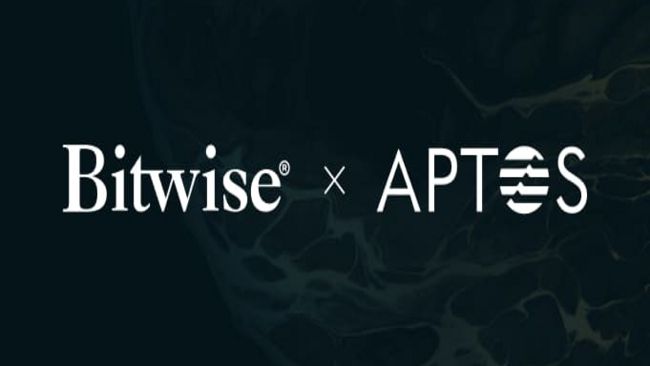A prominent Spanish bank has made waves in the financial world by allocating 2% of one of its managed funds to Bitwise’s Aptos Staking Exchange-Traded Product (ETP). Listed on the Swiss SIX Exchange, this ETP allows investors to stake Aptos (APT) tokens and earn passive income, making it an innovative option for traditional financial institutions looking to integrate crypto into their portfolios. The move is seen as a significant step toward mainstream adoption of cryptocurrencies, with industry experts wondering whether other institutions will follow suit.

Snap | Source: X
This groundbreaking development was announced by Bitwise Asset Management CEO Hunter Horsley, who emphasized the growing sophistication of institutional investors in the cryptocurrency market. He hailed the move as a pivotal moment in the ongoing integration of crypto into traditional finance, underscoring the mainstream era of crypto adoption.
Significance of Allocation in Aptos’ Growth
The Spanish bank’s decision to allocate 2% of its fund to Bitwise’s Aptos Staking ETP marks a milestone in the institutional adoption of digital assets. While the bank’s identity has not been disclosed, its allocation reflects a growing recognition of crypto as a viable investment avenue among traditional financial players. The Bitwise Aptos Staking ETP is designed to deliver an expected annual return of 4.7% by staking Aptos tokens. This innovative investment vehicle not only offers passive income but also aligns with the bank’s strategy to explore high-yield options in regulated environments.
This is not the first time financial institutions have dipped their toes into crypto. However, what sets this move apart is the focus on staking, a process where cryptocurrency holders lock up their assets to support blockchain operations in exchange for rewards. Unlike conventional investments in Bitcoin or Ethereum spot products, staking ETPs offer unique value propositions, such as combining yield generation with regulated investment structures.
Bitwise, a leading asset management firm, launched the Aptos Staking ETP in November on Switzerland’s SIX Exchange, a hub for cutting-edge financial products. This ETP provides institutions with a secure, regulated platform to participate in blockchain staking without directly managing crypto wallets or private keys. Such convenience and compliance are critical factors driving institutional interest in products like these.
The Spanish bank’s investment comes at a time when the Aptos blockchain is experiencing rapid growth. Known for its focus on scalability and user-friendly decentralized applications (dApps), Aptos has emerged as one of the fastest-growing blockchain ecosystems. According to Nansen, a leading blockchain analytics platform, active addresses on the Aptos network reached 1.2 million this month, highlighting increased activity and adoption.
Further supporting Aptos’ growth trajectory is the 2024 Electric Capital Developer Report, which ranked Aptos as the second-fastest-growing ecosystem in terms of developer activity. Between Q3 2023 and Q4 2024, the number of developers contributing to the network surged by an impressive 96%. This growth is attributed to Aptos’ innovative approach to blockchain technology, which emphasizes efficiency, scalability, and developer-friendly tools.
Despite these positive developments, Aptos’ native token, APT, has not seen a significant price rally. Over the past week, the token gained just 1.4%, trading at $14.19. Over the past month, its price rose by a modest 16%, lagging behind other crypto assets that have experienced larger rallies. However, analysts believe the ecosystem’s growing developer activity and network adoption could positively impact APT’s valuation in the long term.
Institutional Interest Rises as Regulation Drives Adoption
Bitwise CEO Hunter Horsley has consistently highlighted the growing interest in crypto from traditional financial institutions. In his announcement of the Spanish bank’s allocation, Horsley pointed out that the move signals a shift in institutional sentiment toward digital assets. According to Horsley, the era of mainstream crypto adoption is underway, with more financial institutions employing crypto-savvy strategies to diversify their portfolios.
Horsley’s optimism is supported by broader market trends. Institutional investors have shown increased interest in crypto investment vehicles, particularly those offering regulatory compliance and transparency. Products like the Aptos Staking ETP cater specifically to these demands, providing a secure and regulated way for institutions to participate in blockchain technology.
Regulation plays a crucial role in attracting institutional investors to the crypto market. Products like the Bitwise Aptos Staking ETP are designed to meet stringent regulatory standards, ensuring transparency, security, and compliance. This alignment with regulatory requirements makes it easier for traditional financial institutions to invest in crypto without facing significant legal or operational risks.
The Swiss SIX Exchange, where the Aptos Staking ETP is listed, is known for its rigorous regulatory framework. This reputation for compliance and innovation has made it a preferred destination for crypto-focused financial products. By listing on SIX, Bitwise has positioned its Aptos Staking ETP as a trusted investment vehicle for institutions.
Why Staking ETPs Appeal to Institutions and Their Growing Adoption
Staking ETPs like Bitwise’s Aptos product offer unique advantages that make them appealing to institutional investors. First, they provide a regulated way to earn passive income through blockchain staking without requiring direct involvement in the technical aspects of crypto. This eliminates the need for institutions to manage private keys, stake tokens manually, or navigate the complexities of blockchain networks.
Second, staking ETPs offer predictable yields, which are attractive to institutions seeking stable returns. The Aptos Staking ETP, for example, promises an expected annual yield of 4.7%. In a low-interest-rate environment, such returns can be highly appealing to institutional investors looking for alternative income-generating assets.
Finally, staking ETPs align with the growing demand for ESG (environmental, social, and governance) investments. Many staking mechanisms, including Aptos’, are energy-efficient compared to traditional proof-of-work blockchains like Bitcoin. This makes staking ETPs an attractive option for institutions prioritizing sustainability in their investment strategies.
The Spanish bank’s allocation to the Aptos Staking ETP raises an important question: will other institutions follow suit? While it is too early to predict a widespread shift, there are several reasons to believe that institutional interest in crypto-staking products will continue to grow.
The success of Bitwise’s Aptos Staking ETP could inspire other asset management firms to launch similar products, further expanding the range of options available to institutional investors. As more financial institutions recognize the potential of blockchain staking, demand for regulated staking products is likely to increase. As governments and regulatory bodies provide clearer guidelines for the crypto industry, traditional financial institutions will feel more confident in allocating funds to digital assets.
As the Aptos ecosystem continues to grow and attract developer activity, its long-term potential remains promising. Meanwhile, the increasing interest from traditional financial institutions signals a broader shift toward mainstream adoption of crypto. Whether other institutions will follow the Spanish bank’s lead remains to be seen, but the momentum is undeniable. As crypto continues to mature, it is poised to become an integral part of the global financial system.
 cryptonews.net
cryptonews.net
